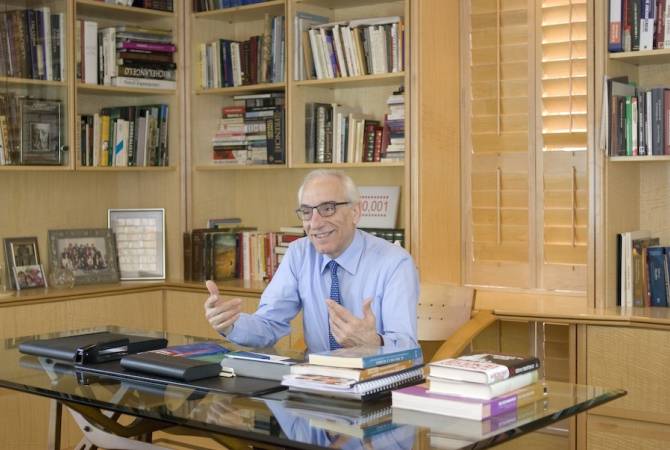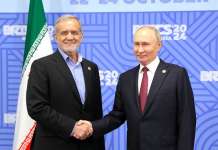Greg Sarkissian, President of the Zoryan Institute has responded to the statement by the Lemkin Institute in which the latter accused Prime Minister of Armenia Nikol Pashinyan of denying the Armenian Genocide.
The article reads as follows:
“This article aims to better understand the statement released on May 10, 2024, by the Lemkin Institute unjustifiably “Condemning Prime Minister Nikol Pashinyan’s Cryptic Engagement with Genocide Denial.” This statement was issued in response to Prime Minister Nikol Pashinyan’s message on the occasion of the 109th anniversary of the Armenian Genocide on April 24, 2024. I found the Lemkin Institute’s article surprising, unnecessary and irresponsible and reading it left me seeking to understand the motivations and foundations for its claims.
“As the President of the Zoryan Institute, I would like to underscore that this article does not reflect the official position of the Zoryan Institute, nor does it serve as an endorsement of Mr. Pashinyan’s message on the occasion of the 109th anniversary of the Armenian Genocide, or approval or disapproval of his performance as Prime Minister of the Republic of Armenia. The opinions expressed herein are my own as someone who has dedicated my life to the studies of the phenomenon of genocide as a universal experience, and its relation to human rights.
“At the outset, I would like to express my gratitude and appreciation for the work undertaken by the Lemkin Institute in the field of genocide studies. In particular, I want to pay tribute to Dr. Elisa Von Joeden-Forgey, Co-Founder and Executive Director of the Lemkin Institute. Dr. Von Joeden-Forgey is a former Endowed Chair in Holocaust and Genocide Studies, Keene State College, Keene, NH, USA. I personally admire her dedication to the field of genocide studies and for the work she undertakes at the Lemkin Institute. We, at the Zoryan Institute, are grateful for Dr. Von Joden-Forgey’s many years of contributions including as member of faculty and acting director of the GHRUP University Program, as former editor of Zoryan Institute’s Genocide Studies International journal, and finally as a formerly active Board Member.
“Now as to why I was conflicted reading the Lemkin Institute’s recent article raising concerns about Prime Minister Pashinyan’s engagement with genocide denial. Genocide denial is defined as the attempt to deny or minimize the scale and severity of an instance of genocide. Denial itself, is an integral aspect of genocide.
“In the very first paragraph of Prime Minister Nikol Pashinyan’s Armenian Genocide commemoration message of April 24, 2024, Mr. Pashinyan clearly asserts the purpose of that day and concisely affirms the Armenian Genocide: “Today we commemorate the memory of 1.5 million victims of the Armenian Genocide, the Meds Yeghern, who were put to the sword in the Ottoman Empire since 1915 for being Armenians.” In this paragraph, which seems to have been inadvertently excluded from the Lemkin Institute’s analysis, Mr. Pashinyan does not attempt to deny or minimize the scale of the Armenian Genocide; rather, he emphasizes four implicit affirmations of genocide recognition:
- First, he establishes parity between the terms “Armenian Genocide” and “Meds Yeghern” allowing for their interchangeability.
- Secondly, by affirming the loss of 1.5 million Armenians, he shows no attempt to deny or minimize the scale and severity of the genocide.
- Furthermore, he acknowledges that 1.5 million Armenians were put to the sword throughout the Ottoman Empire, not just Anatolia.
- Lastly, that these 1.5 million victims were massacred simply for being Armenians, based on national, ethnic, and religious considerations.
“One wonders why the Lemkin Institute’s article does not mention this first paragraph in their analysis, which succinctly recognizes the Armenian Genocide, its magnitude, and the reasons behind it. Interestingly, examining the Prime Minister’s commemorative speech of 2023 reveals a continuum in Mr. Pashinyan’s ideas and philosophy on the subject. He approaches genocide affirmation differently from the way we, as survivors and their descendants, have over the past five or six decades, and brings the impact of inter-generational trauma to the discussion.
“In 2024, he states: “Meds Yeghern became a nationwide tragedy and grief for us, and without exaggeration, is a predetermining factor for our socio-psychology. Even today, we perceive the world, our environment, ourselves under the dominant influence of the mental trauma of the Meds Yeghern, and we have not overcome that trauma.” This means that, being an internationally recognized state, we often relate and compete with other countries and the international community in a state of mental trauma, and for this reason, sometimes we cannot correctly distinguish the realities and factors, historical processes and projected horizons.
“In 2023, he stated: “The April 24 march is perhaps the most impactful occurrence that has predetermined and is predetermining our reality, an exceptional day to think about our history, past and future. What do young parents think when walking to the Tsitsernakaberd memorial, often holding the hands of young children, or what do elderly people with more life experience think?” They are probably thinking about two questions. Why did the Meds Yeghern happen and what should be done to prevent its recurrence? Hundreds and thousands of works have been written about the causes of the Armenian Genocide, many reasons and motives have been revealed. As for the methodology to exclude the recurrence of such a crime, it largely depends on our understanding of the concepts of “state” and “region”.
“To me, it seems that Prime Minister Pashinyan is affirming the recognition of the Armenian Genocide while simultaneously seeking ways to help deal with the trauma which has shaped Armenians and their outlook on the future – especially for those living in today’s Armenia, a sovereign state.
The Lemkin Institute article states: “While we do not generally involve ourselves in domestic affairs of states unless there is an internal threat of genocide, we must address concerns stemming from recent statements made by Armenian Prime Minister Nikol Pashinyan that appear to diverge from fundamental principles of genocide prevention, genocide recognition, and transitional justice, and that directly relate to issues of Armenian national security.” In my opinion, the Lemkin Institute’s misinterpretation of the Prime Minister’s message as an internal threat of genocide has led to an unwarranted and unjustified interference in the internal affairs of the state. Consequently, their concerns were not called for.
“There was no divergence from the governing principles of genocide prevention as prescribed by the Genocide Convention, which aims to prevent atrocity crimes against humanity and to understand the root causes of those crimes, particularly genocide. This is clearly the sentiment in Pashinyan’s message:
What should we do and what should we not do in order to overcome the trauma of genocide and exclude it as a threat? These are questions that should be the key subject of discussion in our political and philosophical thinking, but this kind of point of view of dealing with the fact of the Meds Yeghern is not common among us.
“By intentionally omitting the opening statement of the Prime Minister’s remarks from the article, and falsely interpreting the overall essence of Mr. Pashinyan’s statement, the writer has acted irresponsibly by politicizing the Lemkin Institute. They had neglected the statement of the Foreign Minister on the same date which clearly affirms the Armenian Genocide. At the very least, a detached, objective, and thorough analysis would have indicated reasons for not including the entirety of the message. Finally, to restore its reputation as a scholarly organization, the Lemkin Institute must issue a public apology to Prime Minister Pashinyan and the people of Armenia.”












